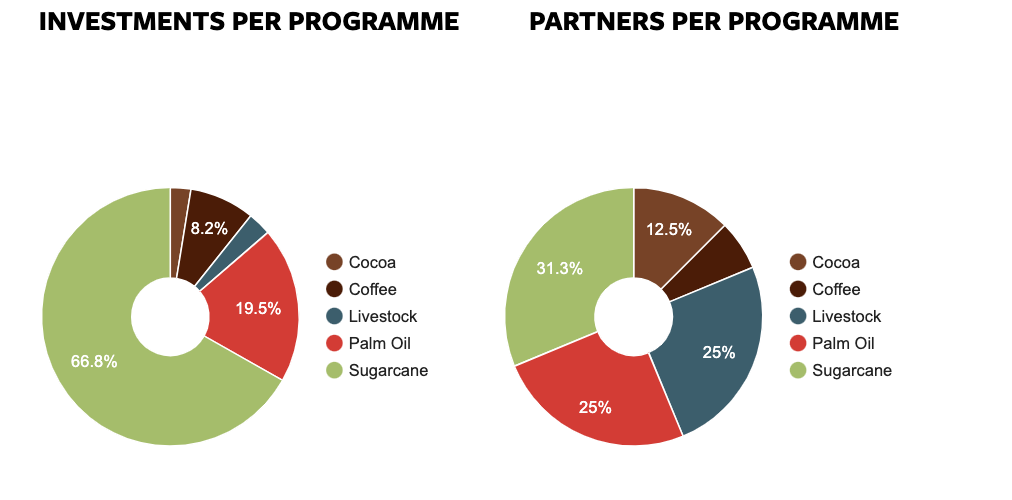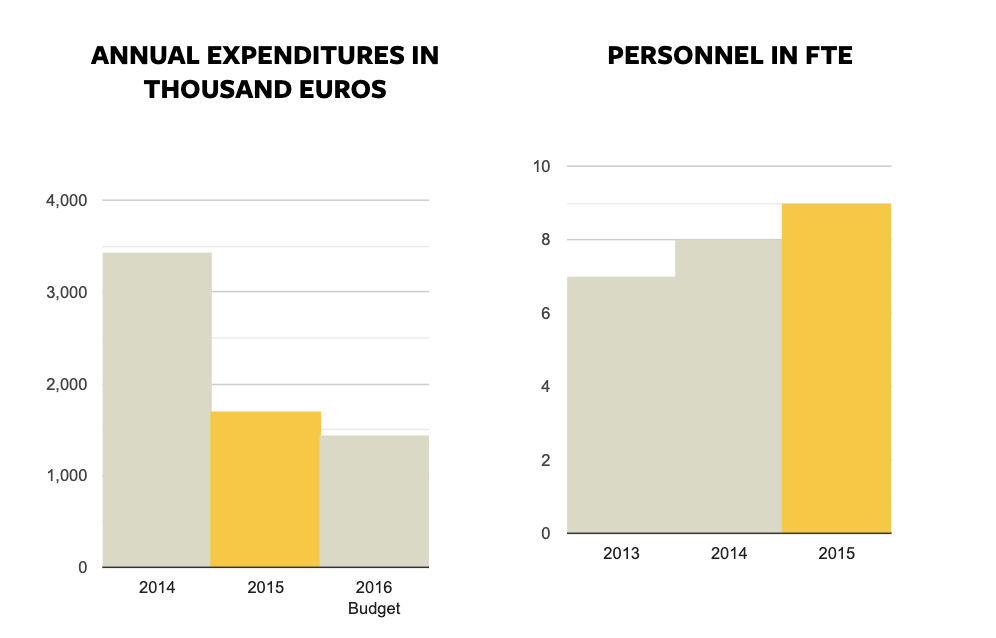REGIONAL COMMODITY PROGRAMMES
Solidaridad partnered with local CSO Community Cloudforest Conservation (CCC) to expand its WALC programme for improving gender equity, food security and nutrition in cocoa farming families in Alta Verapaz, Guatemala, through women-centred agroecological education, leadership training and access to formal education.

The Back to REDD+ coffee project in Mexico validated a technological package to hasten renovation and rehabilitation of plantations decimated by leaf rust while also decreasing emissions, thereby restoring livelihoods to vulnerable smallholder families. Innovations in pruning, leaf rust resistant varieties, and intensification of production lead to more efficient agroforestry systems that can also address food security and help adapt to climate change.

The Farmer Support Programme funded project in Nicaragua “Competitive beef and dairy through sustainable intensification and specialized market access – GANASOL” aimed to increase the competitiveness and income of small and medium cattle farmers in Nicaragua through implementation of good farm management practices. The goal is to facilitate sustainable livestock production and increased resilience to climate change, and improved market access for milk and meat products.

Multi-stakeholder Palma de Aceite Sostenible Honduras (PASH) consortium continues to be a leader in the region as they moved to certify a smallholder base of more than 12,000 producers. Mexico and Nicaragua producers joined the movement when Solidaridad introduced the Mesoamerican Palm Oil Alliance (MAPA), a knowledge platform that accelerates the uptake of sustainable practices and leverages funding and innovation from major players throughout the supply chain.

Only two and a half years after launching a pilot sugarcane project in Mexico, Solidaridad has achieved international visibility as the leading organization in Mesoamerica capable of facilitating systemic change in the sugarcane sector, from best practices in the mill and field to occupational safety and health interventions that promise to eradicate chronic kidney disease among sugarcane cutters.

DEVELOPMENTS
In response to increasing demand for support on issues of productivity, social and environmental performance, Solidaridad is replicating and geographically expanding proven interventions in coffee and livestock, and introducing two regional platforms that build on the success of sugarcane and palm oil projects in the region. These two initiatives will accelerate the uptake of best and continual improvement practices across the región via knowledge transfer and exchange (physical and virtual), mechanisms to leverage resources in a pre-competitive environment, the introduction of mobile information and communication technology to faciliate outreach to smallholder producers and analytics for policy influencing. The initiatives will also strengthen multi-actor platforms for dialogue and action, in addition to closing the gap between commitments and availability for Bonsucro and RSPO-certified products.
PanAmericana is a formal strategic partnership between Solidaridad and Bonsucro that will build on momentum in the Mexican sugarcane industry and span through Central America to Colomibia, Bolivia, Argentina and Paraguay.
The Mesoamerican Palm Oil Alliance (MAPA) is our framework for implementing diverse palm oil projects in the región, from integrated landscape and policy initiatives, dialogue and action, to ongoing support for RSPO best practices compliance.
Together with our partners, Solidaridad is moving entire sectors at national and regional levels to verifiable sustainable practices, and from farm to integrated landscape as producers do more with less, practice transparency, dialogue and inclusiveness, increase productiion vertically and build resilience and adaptation to climate change.

ACHIEVEMENTS
The Back to REDD+ coffee project in Mexico validated a technological package to hasten renovation and rehabilitation of plantations decimated by leaf rust while also decreasing emissions. This helped to restore livelihoods to thousands of vulnerable smallholder families. Innovations in pruning, rust resistant varieties, and intensification of production leads to more efficient agroforestry systems that can also address food security and enhance adaptation to climate change.
In Nicaragua, the GANASOL livestock project doubled milk production through improved pastures and animal health, and moved approximately 90% of producers from milk grade C and B to grade A, resulting in increased income and healthier animals. It also provided incentives for more efficient production which can lead to improved land use planning and decrease the deforestation threat.
Mexican sugar mills lead the region in sustainable environmental, social, labour and production practices, contributing to the conceptual framework of PanAmericana. Two Mexican mills are expected to achieve Bonsucro certification by mid-2016. Mill El Angel in El Salvador demonstrates leadership and vision by collaborating in research and the testing of the Worker Health and Efficiency protocol to mitigate Chronic Kidney Disease in sugarcane cutters.
Three palm oil producers in Honduras have achieved RSPO certification as the other eight producer partners continue to bridge the compliance gap. Guatemala producers are dramatically reducing use of inputs through implementation of Integrated Pest Management practices.

PARTNERSHIPS
Dutch donors, including the Dutch Ministry of External Relations (DGIS) and the Dutch Postcode Lottery (NPL), have provided critical funding which has led to opportunities to leverage significant co-financing from private sector, implementing partners, other donors, and brands.
Major partnerships range from implementing organizations such as WWF, SNV, ILO and Proforest, to standards such as Bonsucro, RSPO, Utz and Fairtrade. The NPL-funded Worker Health and Efficiency (WE) programme that addresses Chronic Kidney Disease (CKDnT) in cane cutters has an unprecedented level of collaboration with research institutions and government bodies from around the world, including Mill El Angel, La Isla Foundation, Agdysa, Univeristy of Colorado, CDC, PAHO, OSHA, London School of Tropical Medicine & Hygiene, Karolinska, Lund University, SALTRA and regional Ministries of Health and Labour, as well as many other institutions and individuals. These leading organizations have provided the highest levels of professional expertise and credibility as well as matching funds in our efforts to end the tragic CKDnT epidemic.
Finally, our work is based on partnership with mills, extraction plants, producers from small to large, and their chambers and unions in five major sectors: palm oil, sugarcane, livestock, coffee, cacao. The growing trust, transparency and commitment to sustainability is proof of the profound organizational and personal change that is occurring throughout the region.
ORGANIZATION
Solidaridad Central America continues to improve on all aspects of operational and project management. In 2015, staff participated in organization-wide meetings with the various commodity, programme management and financial control teams. Staff also participated in and presented at multiple national and international events. Outreach to industry, brand and implementing partners solidified concepts for the development of the 2016-2020 multi-annual strategic plan.
As the team grows and diversifies the regional portfolio, management and staff periodically meet to:
- Provide updates on all projects under implementation, progress on proposals under development, and discuss opportunities identified and general trends on both national and regional levels.
- Receive training on issues related the Solidaridad Central America’s role in the network and in our region; in 2015, staff were trained in High Conservation Value assessment, and advanced RSPO and Bonsucro standards interpretation.
- Identify and discuss innovations and tools that can accelerate change that matters in the various sectors and country settings.
- Focus on team building, improvement of our management systems, and innovation for continual improvement in parallel with our projects under implementation.
